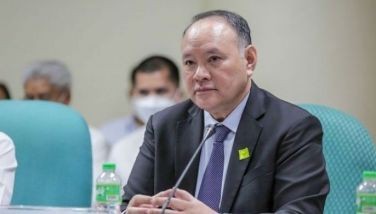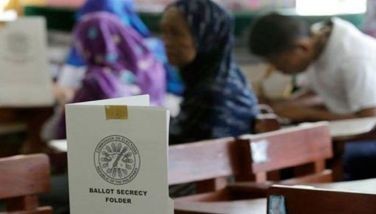GMA appeals to politicians to help prop up peso

January 28, 2004 | 12:00am
With the peso’s plunge to an all-time low of 55.85 to $1 in yesterday’s trading, President Arroyo appealed to politicians to help prop up the country’s weakened currency.
In her statement yesterday, she linked the peso’s poor performance to market reactions to the onset of the political fever prior to the May 10 elections.
"This is the time to do away with traditional politics and turn our focus instead on how we could alleviate poverty through a sound platform of government," she said.
"We pose this challenge to other presidential contenders and down the line, to all the candidates in the forthcoming elections," the President added.
Mrs. Arroyo, herself an economist, cited assessments made by market and economic analysts on the reasons for the peso’s continued fall despite the country’s strong macroeconomic fundamentals.
The peso plummeted to its previous all-time low of 55.85 to $1 during last Monday’s trading.
"Market and economic analysts have made it clear that the fate of the peso largely depends on the mode of the campaign and the kind of elections that we will have," Mrs. Arroyo said.
"We are committed to a decent and civil campaign and to clean, honest and orderly polls. We have had enough of dirty politics and elections for the past years and history tells that is one of the setbacks to our economic stability and growth," she pointed out.
Only last week, Mrs. Arroyo took the position that political turmoil in the country should not take all the blame for the peso’s fall.
"The reflex of blaming vagaries in the economy on politics should be resisted. Election-related issues are one of the minor factors affecting the peso’s performance and this is a transient influence," she said in a previous statement.
She also blamed the weakening of the peso, which started two weeks ago, to the increasingly stronger economy of the United States.
"We should consider this issue objectively and acknowledge that the weakness of the peso is fundamentally tied to the strengthening of the American economy," Mrs. Arroyo said.
She assured the public that despite these developments, the peso remains strong because of the country’s strong macroeconomic fundamentals that can absorb the shocks to the market due to the election fever.
"We have a stable economy, which has been turned around in such a short span of time and will continue to provide the backdrop for more investments and growth to provide jobs and improve the lot of average Filipinos," the President earlier said.
Presidential Spokesman Ignacio Bunye, for his part, said that no less than the officials of the Bangko Sentral ng Pilipinas, led by BSP governor Rafael Buenaventura, remain bullish on the peso’s capability to recover from "transient" shocks that weakened the country’s currency vis-à-vis the greenback.
"Our economy is fundamentally sound," Bunye told the government-run Radyo ng Bayan yesterday. "The Bangko Sentral has explanations on this and all that we can add to that is we should have more faith in our economy."
He sought to allay the public’s concerns, saying that the peso’s nosedive to its previous all-time low Friday was nothing but a transient reaction of the market to temporary political jitters brought about by the May elections.
"The ups and downs of the peso are driven in partly by the day-to-day speculations and vagaries affecting the political situation," Bunye said. "But macro-economic stability is firm and our political stability is unsullied."
However, Bunye strongly warned currency speculators against engaging in profiteering and riding on "transient public anxieties." He pointed out that "speculators should not take advantage of the situation. They might themselves be the ones who get burned when the time comes because on the long term basis, we can see our economy is really strong."
Buenaventura has repeatedly warned that much of the uncertainties in the market stemmed from the fact that none of the presidential candidates have made a clear statement indicating the direction of their economic agenda.
Meanwhile, dealers said the nervousness ahead of the May 2004 polls was partly to blame for the sharp drop, despite talk that the BSP intervened to support the peso at 55.85. — With Jose Rodel Clapano, Paolo Romero, AFP
In her statement yesterday, she linked the peso’s poor performance to market reactions to the onset of the political fever prior to the May 10 elections.
"This is the time to do away with traditional politics and turn our focus instead on how we could alleviate poverty through a sound platform of government," she said.
"We pose this challenge to other presidential contenders and down the line, to all the candidates in the forthcoming elections," the President added.
Mrs. Arroyo, herself an economist, cited assessments made by market and economic analysts on the reasons for the peso’s continued fall despite the country’s strong macroeconomic fundamentals.
The peso plummeted to its previous all-time low of 55.85 to $1 during last Monday’s trading.
"Market and economic analysts have made it clear that the fate of the peso largely depends on the mode of the campaign and the kind of elections that we will have," Mrs. Arroyo said.
"We are committed to a decent and civil campaign and to clean, honest and orderly polls. We have had enough of dirty politics and elections for the past years and history tells that is one of the setbacks to our economic stability and growth," she pointed out.
Only last week, Mrs. Arroyo took the position that political turmoil in the country should not take all the blame for the peso’s fall.
"The reflex of blaming vagaries in the economy on politics should be resisted. Election-related issues are one of the minor factors affecting the peso’s performance and this is a transient influence," she said in a previous statement.
She also blamed the weakening of the peso, which started two weeks ago, to the increasingly stronger economy of the United States.
"We should consider this issue objectively and acknowledge that the weakness of the peso is fundamentally tied to the strengthening of the American economy," Mrs. Arroyo said.
She assured the public that despite these developments, the peso remains strong because of the country’s strong macroeconomic fundamentals that can absorb the shocks to the market due to the election fever.
"We have a stable economy, which has been turned around in such a short span of time and will continue to provide the backdrop for more investments and growth to provide jobs and improve the lot of average Filipinos," the President earlier said.
Presidential Spokesman Ignacio Bunye, for his part, said that no less than the officials of the Bangko Sentral ng Pilipinas, led by BSP governor Rafael Buenaventura, remain bullish on the peso’s capability to recover from "transient" shocks that weakened the country’s currency vis-à-vis the greenback.
"Our economy is fundamentally sound," Bunye told the government-run Radyo ng Bayan yesterday. "The Bangko Sentral has explanations on this and all that we can add to that is we should have more faith in our economy."
He sought to allay the public’s concerns, saying that the peso’s nosedive to its previous all-time low Friday was nothing but a transient reaction of the market to temporary political jitters brought about by the May elections.
"The ups and downs of the peso are driven in partly by the day-to-day speculations and vagaries affecting the political situation," Bunye said. "But macro-economic stability is firm and our political stability is unsullied."
However, Bunye strongly warned currency speculators against engaging in profiteering and riding on "transient public anxieties." He pointed out that "speculators should not take advantage of the situation. They might themselves be the ones who get burned when the time comes because on the long term basis, we can see our economy is really strong."
Buenaventura has repeatedly warned that much of the uncertainties in the market stemmed from the fact that none of the presidential candidates have made a clear statement indicating the direction of their economic agenda.
Meanwhile, dealers said the nervousness ahead of the May 2004 polls was partly to blame for the sharp drop, despite talk that the BSP intervened to support the peso at 55.85. — With Jose Rodel Clapano, Paolo Romero, AFP
BrandSpace Articles
<
>
- Latest
- Trending
Trending
Latest
Trending
Latest
Recommended






























